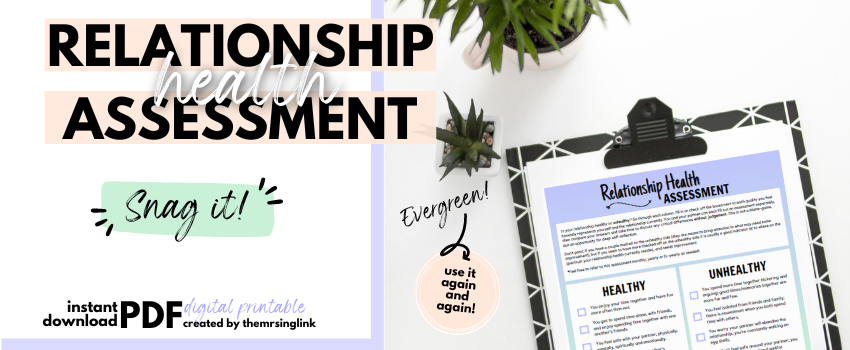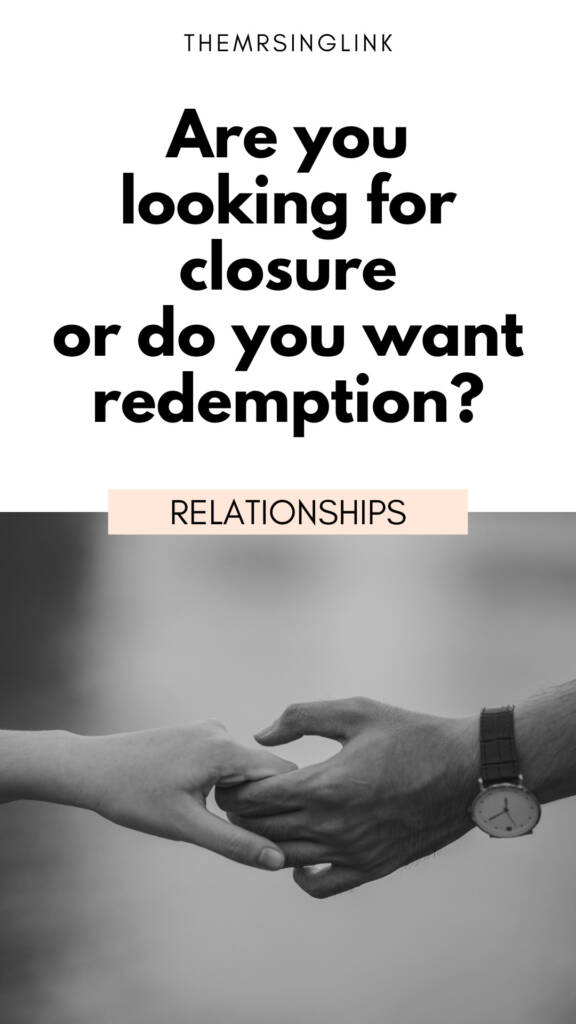Ask yourself the hard, pivotal post-breakup question when it comes to relationships: what does closure mean to me? And really, be frank, don’t hold back. Because that’s what this post is about – figuring out what it can actually mean to want closure, and maybe even closure you didn’t get.
The hard truth is, on a dime, getting closure is simply the confirmation of the why.
Why it didn’t work out.
And..
Why there’s x% chance of working things out, again.

It’s that simple, but yet of course, it’s also not. There’s the why he stopped loving me, why he had to cheat and lie, why he cared so little, why he couldn’t try harder, why I wasn’t enough, etc. etc. And, so, I get it. Closure can be fickle, sticky, and somewhat of a never-ending scab that comes back once you’ve picked it. Therefore, sometimes, when people seek closure in their relationship they actually mean something else.
So that’s why I ask: do you really want closure, or are you looking for redemption in your relationship?

Do you want closure or redemption in a relationship?
Sometimes wanting closure in a relationship actually means…
“I need to know that it’s you, not me.” As you already [should] know, no one’s perfect. And not everyone is perfect for you, nor are you perfect for everyone. Nonetheless, a breakup usually has a one-sided fault, and sometimes you just want the clarity in knowing that fault isn’t yours. So it isn’t unfathomable to want to hear, “you’re great – the perfect person for me, in fact – I just can’t give you what you deserve.” **And, yes, that “can’t” is usuuuuually “won’t” or “don’t want to”.
Little do you [probably] know, getting the answer won’t necessarily make you feel any better, huh? Instead, more like a bee sting on a soft spot. Because, while sure, you might feel you have the upper hand, esteem intact and your ego [somewhat] boosted…did it confirm what you needed to hear?
“I want to be chosen.” Take a small swig of this wisdom: you won’t always be worth or meant for the [their] picking. This isn’t as harsh as it sounds, especially when I said above that you’re not meant for everyone and not everyone is meant for you. You could be this perfect person – even someone who has rarely experienced rejection – yet you won’t always be what someone is wanting or looking for. So to be chosen [by someone] requires little to no advancement or coercion on your part. This means you won’t need to earn or perform for it.
“I want to change your mind.” You want to convince them to stay, you’re hoping they’ll come to their senses, or that they’ll see you differently. Maybe you have taken strides to change or made certain promises. Either way, you decide as a last-ditch effort to be an unavoidable obstacle in hopes to divert their conscience or final decision. Much like a pinball machine, except you’re the little flaps that propel the ball, and you’re hoping to send it where you want it to go in order to avoid demise. Cold hard fact, though: regardless of what you might think, that’s a position with very limited control.
Am I saying not to fight for what you want, or love? No, absolutely not. You can certainly take a stand on your feelings while also having the discernment of when to loosen your grip on what you can’t control. It’s as true as they say that if you love something set it free because love is not binding [against one’s will] it’s freeing.
[pt_view id=”5ffcb493er”]
“This isn’t what I wanted / I didn’t get a say in this.” This one can be incredibly painful. Mainly because you probably feel that your feelings no longer or never mattered, and this can be debilitating and traumatic to accept let alone tolerate. That someone with the most power in the relationship is the person who decides to end it. Let that sink in for a minute. *New fear unlocked.
Again, this really is just another uncontrollable aspect in relationships. But I try to see it like this: there’s far more power [impenetrable strength] in the person who chooses to trust in the very thing that could easily destroy them. So, please, if this is your situation, do not let this crumble your strength.
“I get the last word.” This doesn’t mean maliciously, either. Oftentimes breakups fuel something inside people that had been tucked away or that they were unaware of until it was forced to breach the surface. Yes, this can mean saying all the things you’ve wanted to say (over the course of the relationship), establishing the feeling of ending things on your terms, or it can be your last and final breath to peace. There are just some things that may need to be said, aloud, face-to-face (for all ears to hear) in order to move on, forgive, let go and find acceptance.
Just know that your words (as impactful as they are) may fall on deaf ears, so do this for you, not out of retaliation. Another way you can do this is through writing (a journal or in a letter).
[mailerlite_form form_id=23]“I need an apology / I need them to forgive me.” Yes, I know, this one should be at the top. But you made it here, and I’ll bet most of you felt this. Listen closely, and I say this with love for your heart and soul’s healing: if they haven’t apologized, it’s either they aren’t actually sorry and/or because they are wounded [in pain] themselves and they don’t have the capacity to acknowledge the pain they cause others. And the hard truth is you may never get an apology.
As for forgiveness – if you need to be forgiven through reconciliation (in this case, getting back together or working things out), then you’re not seeking true forgiveness. Therefore, remember, forgiveness might not come in the [timely] manner or way you need/want it.
If you take away anything from closure, make sure it’s this: it becomes problematic when your healing depends on someone else (or getting what you need from them).